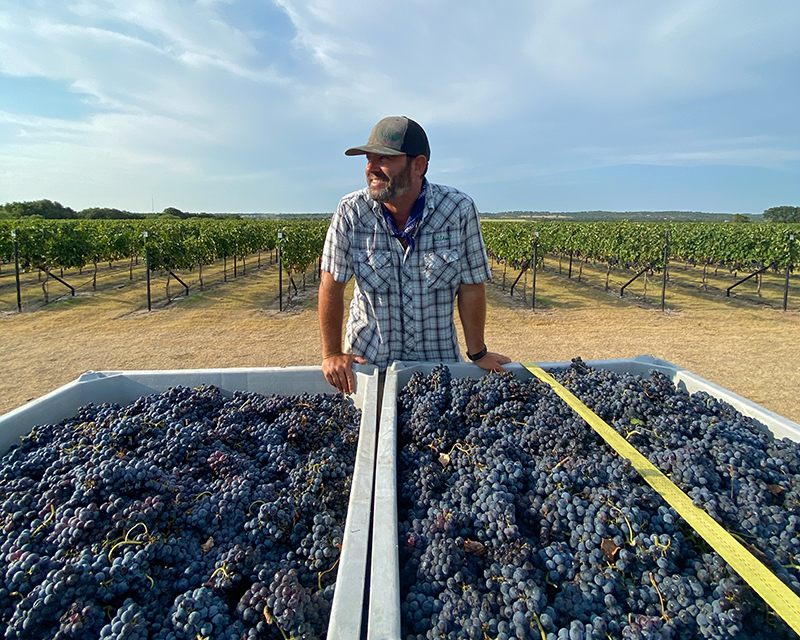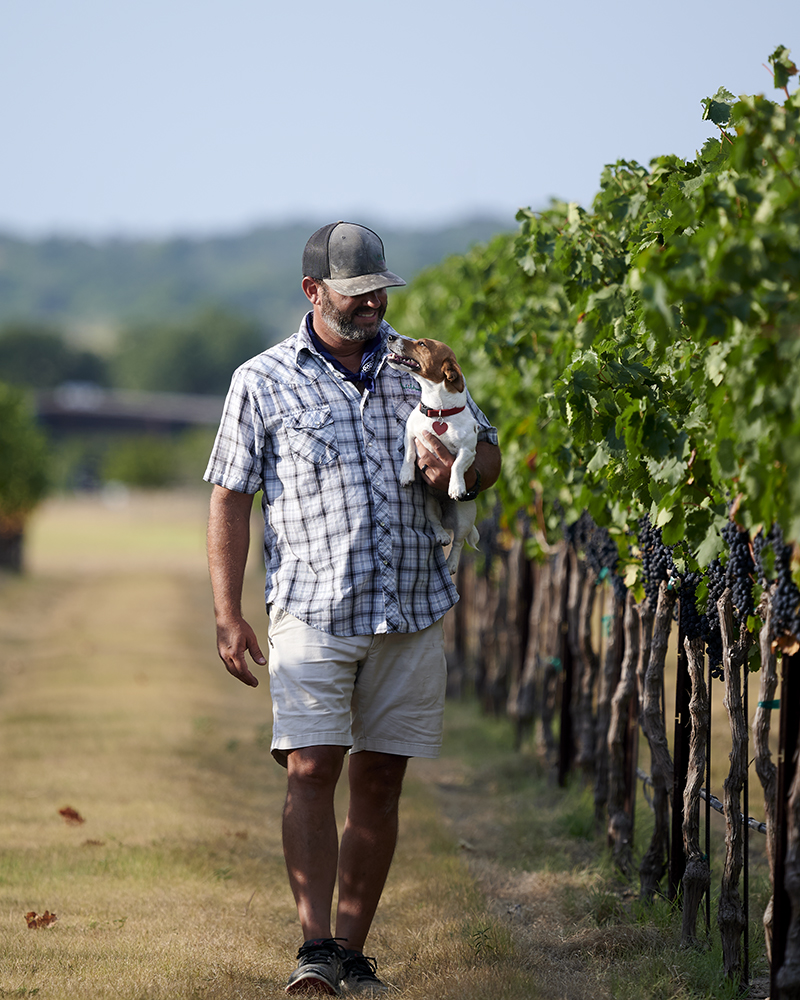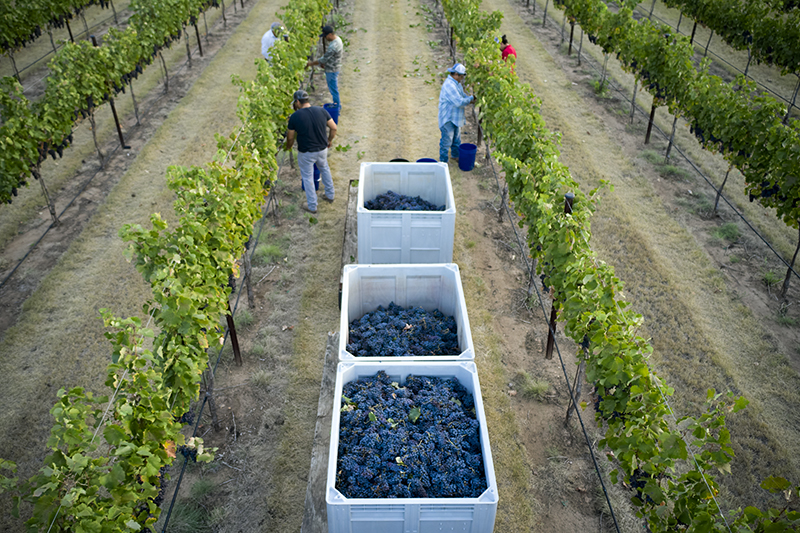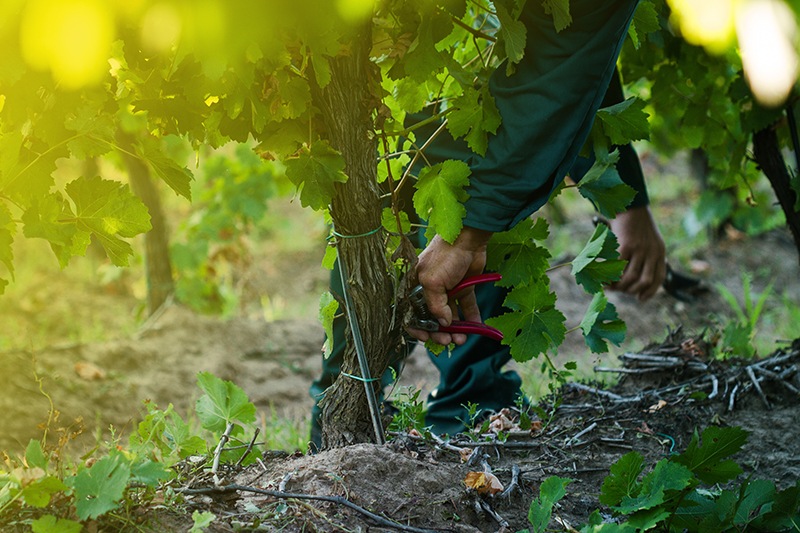Galileo may have said, “Wine is sunlight held together by water,” but there are a few other necessary ingredients. One is labor, always in short supply and increasingly expensive. And Mother Nature, granter of sunlight and water, does not always show up on the appointed day.
“I always tell everyone we’re in a constant state of drought that’s interrupted every now and then by a biblical flood,” jokes Ryan Thomas.
What’s a vineyard owner to do? Time to bring in special forces: VineOps vineyard services, owned by Thomas and located in Fredericksburg.

“I say we’re not trying to be anyone’s vineyard manager — chances are you already have one. Think of us as your reinforcements, boots on the ground. We’re the rescue mission, the special ops guys. We parachute in, get the job done, get out,” Thomas said. “Let us customize our services to your needs. You don’t have to use me for everything. We’re here if you need us.”
Thomas is a fourth-generation farmer, who started driving a tractor at age 12 and worked summers in the field.
“After I graduated high school I knew I wanted to be a farmer, to continue that lifestyle,” Thomas said. “It’s in my blood. I made it my life’s work.”
He has been in and around the burgeoning Texas wine industry for almost 30 years. He knows where the best vines are in every vineyard. He knows the individual winemakers and which wines are their specialties.
“I work with everybody. I know everybody. I’m on everybody’s team,” he said.
Texas wines are growing in popularity and in esteem, winning national and international competitions. But growers have to encourage the general public to try a few unfamiliar varietals.
“Some of the first vines put in here — your merlot, your cabernet sauvignon, chardonnay — they may not grow that great. What we’ve found out over the years is the Spanish and Italian and Portuguese varietals — tempranillo, mourvèdre, trebbiano, albariño — these are vines that grow exceptional fruit in our climate. So why try to grow stuff like Bordeaux? Stick with what grows well and tell that story from farm to table,” Thomas said.

Even customers who value eating and drinking locally may respond to these unfamiliar names with a little pushback, so the job of Texas wineries is to teach them a few new words.
“The challenge we have is training our customer base. We make great viognier, vermintino, alicante bouchet,” he said.
Hill Country varietals are not second-tier — they’re unique, just like a Ruby Red grapefruit is different from a Duncan. And the wine made from local grapes will be good, if vineyards have the labor to keep their vines healthy. That’s where VineOps comes in.
“The local staff at your average vineyard, they’re in the cellar, in the vineyard. They’ve got a lot of things to focus on — they’re a jack of all trades, never really master of one,” he said. “I want VineOps to be master of hands-on vineyard labor.”
That work starts long before the harvest. It begins with pre-pruning, in January, then continues all the spring when everything’s coming up grapevines.
“These wine vines grow so fast throughout the growing season that it’s easy to get behind on the four to five essential hand-labor passes that are required each season. Not one vineyard operation can afford to have the 10-15 guys on staff year-round to be available during those crucial times,” Thomas said.
His crew has received training from Texas’ two top wine consultants: Penny Adams, known as First Lady of the Vineyard, and Fritz Westover, of Westover Vineyard Advising.
“My crew and I have the unique experience of working under both of their mentorships and being able to put all of that knowledge together,” Thomas said. “We’re more of an advanced vineyard crew. It isn’t just a group of guys. A lot of people will hire a landscape company out of Austin. You can kill a vineyard with the wrong pruning cuts.”
Thomas compares pruning to sculpting.
“An incredible amount of thought that goes into every single cut. What we often blame on diseases, but a lot of it, in my opinion, is improper pruning,” he said. “We can take care of these vineyards in a way that’s sustainable, and they’ll last much longer. We’ll get so many more years out of these vines.”
In addition to pruning services, VineOps offers dormant pruning, canopy management, young vine training, and equipment services.
“Specialty vineyard equipment is extremely expensive, again there are not a lot of single operations that can justify the capital expenditure it takes to purchase some of this equipment if they’re only gonna use it once or twice a year, if they only have 3-4 acres,” Thomas said. “I’m able to amass pieces of equipment so I can offer it as a service to everyone.”

Because, as Thomas likes to remind people, “Phenology waits for no one.”
“That came from Fritz Westover. If you don’t have a big enough crew or enough guys to march through the vineyard, you fall behind. Grapes are a hands-on crop,” he said.
Susan Johnson of Texas Heritage Vineyard has used VineOps for several years.
“Even for us, with just 12-and-a-half acres of grapes, Ryan’s crew is able to, with as many guys as they’ve got, they can knock that out in three or four days, usually,” she said. “It’s impossible for us to keep a payroll of people that would be able to do the things that he does. Most of the time when there’s work to be done in the vineyard, it needs to be done in a fairly small window of time.”
VineOps has been in Texas Heritage’s vineyard for years, so it knows where the older vines are and the younger ones and the kind of care each needs.
“Grapes grown here in the Hill Country, it’s so much more fun to serve those and talk about how those were grown 6 miles from here, or 4 miles from here, so you’re getting the terroir of our limestone and caliche soils in the bottle,” Johnson said.
Thomas knows that in order for the Texas Hill Country wine industry to continue to grow in scale and reputation, it has to produce good grapes. VineOps is here to fill in the gaps so that those wines with very un-French-sounding names get a farmer’s footsteps at exactly the right moment.
“You can’t make good wine out of bad grapes,” Thomas said.


